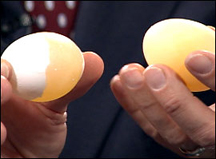Naked Eggs – A Different Twist
It’s a classic experiment and a sure-hit favorite around Easter.  Soak a raw egg in vinegar and over the course of time, the vinegar will dissolve the eggshell. What you’re left with is the egg’s translucent membrane to protect the egg. Even though it’s a classic, I’ve never done this demo on the television show because it takes so long for the eggshell to dissolve in vinegar (about 7 days). But this year I had to try something new. What about substituting 3 molar hydrochloric acid for vinegar? The goal is to dissolve the calcium carbonate in the egg shell and 3M HCl should do the trick. The first attempt was a success, but I stumbled upon a great technique at the same time. Instead of doing the reaction in a beaker, I put the egg in a 1000 mL graduated flask and cover the egg with 150 mL of 3M HCl. This makes the reaction easy to see and very controllable. As the acid dissolves the egg, carbon dioxide gas is produced and a white foam of calcium chloride slowly rises in the cylinder. When the reaction is complete (you’ll see the naked egg), rinse the egg and… Voila… you got a naked egg! Watch the video.
Soak a raw egg in vinegar and over the course of time, the vinegar will dissolve the eggshell. What you’re left with is the egg’s translucent membrane to protect the egg. Even though it’s a classic, I’ve never done this demo on the television show because it takes so long for the eggshell to dissolve in vinegar (about 7 days). But this year I had to try something new. What about substituting 3 molar hydrochloric acid for vinegar? The goal is to dissolve the calcium carbonate in the egg shell and 3M HCl should do the trick. The first attempt was a success, but I stumbled upon a great technique at the same time. Instead of doing the reaction in a beaker, I put the egg in a 1000 mL graduated flask and cover the egg with 150 mL of 3M HCl. This makes the reaction easy to see and very controllable. As the acid dissolves the egg, carbon dioxide gas is produced and a white foam of calcium chloride slowly rises in the cylinder. When the reaction is complete (you’ll see the naked egg), rinse the egg and… Voila… you got a naked egg! Watch the video.
Before you flood the post with comments, I know that hydrochloric acid is not in the kitchen chemist’s bag of goodies. But you have to share something for the chemistry teachers every once in a while.




Very cool. Where can I get some 3M HCl so I don’t have to wait 7 days?
Befriend a high school chemistry teacher. 3M HCl is still a relatively strong acid and needs to be respected. Have a chemistry teacher help you remove the shell after school – it should take about 3 minutes at the most.
i am doing a science progect and i was w discoverd this chemical reaction like an awsome scientist like you or another scientist
I don’t understand how you get the membrane to fluff up again with air. You poke two holes in it? How do you fold it?
By just bouncing the egg membrane between your hands, a little air works it’s way in through the holes. After a few seconds, the membrane fills with air and the egg looks restored. Be sure to take a look at the video…
http://wm.kusa.gannett.edgestreams.net/news/1144710032384-04-10-06-spangler-4p.wmv
sweet! im doing this experiment now, but with a twist! isnt that awsome?
We have been trying to dissolve an eggshell with Diet Coke, but so far the soda has just become very murky. Are the acids in sodas able to dissolve an eggshell? Should we be changing the soda around the egg daily? Could that make a difference?
Has anyone had success dissolving an eggshell with soda?
I like the experiment but i wished it was only three days because i have to do a science experiment
looks really cool. Where can I see the cooked egg demo?
I have done this egg experiment many times with my grandchildren, each time a young one is amazed, I ran out of grand kids, but I actually have a naked egg in a glass of water now waiting for the kids to ?? should I bring it to their school? well finally they said yes, but I didn’t have to wait 7 days, my distilled white vinegar only took 2 or 3 days, it helps to rub the shell off if in a hurry, that works faster, as the children only were at my home for 3 days in a row, so I wanted to “rush it” they loved it, and the older one had forgotten about it when we did it as a youngster, also I have stood an egg on end during the “Spring Equinox” that really shocked them, but my timing has to be correct with that as well, gravity is a playful thing sometime!
Some people use concentrated vinegar – available in many grocery stores – to speed up the process, as well. Chemistry teachers have the luxury of using hydrochloric acid (3 molar works well) and the process goes very quickly (just a few minutes), but handling and disposing of the remaining acid has to be left to the chemistry teachers who know what they’re doing.
Sharon… your grandchildren have to think you’re the coolest science grandma!
If I do the experiment in vinegar… can I eat the egg afterwards? my mom says we can’t waste eggs like that.
If you eat the egg, your skin will fall off and then you’ll be naked… and that would be embarrassing.
I’m doing a project for chemistry and we have to do “science in a coffee shop”. I was wondering how long it would take (or even if it would work) for an egg’s shell to be taken off by coffee. I know coffee is acidic so I wanted to try it but if it takes vinigar 7 days to work, would it take coffee many more days?
Ella – This is a cool idea. My fear is that it would take a long time to dissolve the egg shell using just coffee. While coffee is acidic, it’s not nearly as acidic as vinegar, which can take up to a week to dissolve the calcium carbonate in the shell.
However, science in the coffee shop is an interesting concept. What else could you do? Let me post this question on the blog as a main post and let’s see what people come up with.
One thing that comes to mind is an optical illusion called <a href="https://www.stevespanglerscience.com/content/experiment/magic-arcs-optical-illusion" Magic Arcs, which can be made by pulling apart the cardboard sleeves that go on the outside of the cup (to keep from burning your hand).
what is the hypothesis and how can it help the world?
i have a science fair coming up in about 1 week and i have to know those 2 questions.
and how can you make the egg dissolve faster and what will happen if you put bleach?
Nikkii – here is the link to the Science Fair Secrets section of our website. If you read through here it will help you plan a great science project.
https://www.stevespanglerscience.com/category/science-fair Good luck and have a great time doing your project!
what am i trying to prove with this project and what else do i need to know to get an A+?
i came across this qz in my project i was wondering if someone could help
The eggshell contains calcium carbonate,CaCO3. suggest a simple experiment to confirm that carbonate is present in the shells,given the following materials and chemicals.
– Calcium carbonate powder,CaCO3
_ 1mol dm-3 hydrochloric acid solution,HCl(aq)
-limewater,Ca(OH)2(aq)
-sodium hydroxide,NaOH(aq)
-Test tube
-spatula
-Delivery tube with rubber bung
……hope some 1 can help me…thankz
dose this wok cause my dauter needs it by next next monday
Brilliant – Trying to set this up for next week and ironically can’t get my hands on vinegar, but conveniently have Hydrochloric Acid on hand!